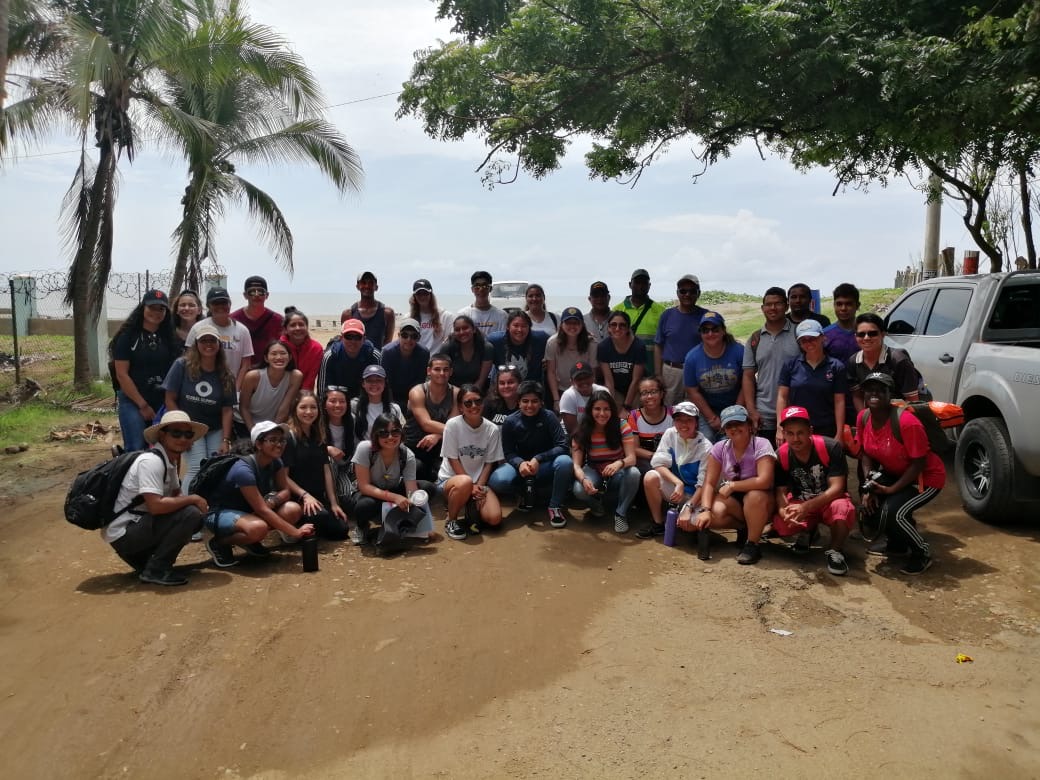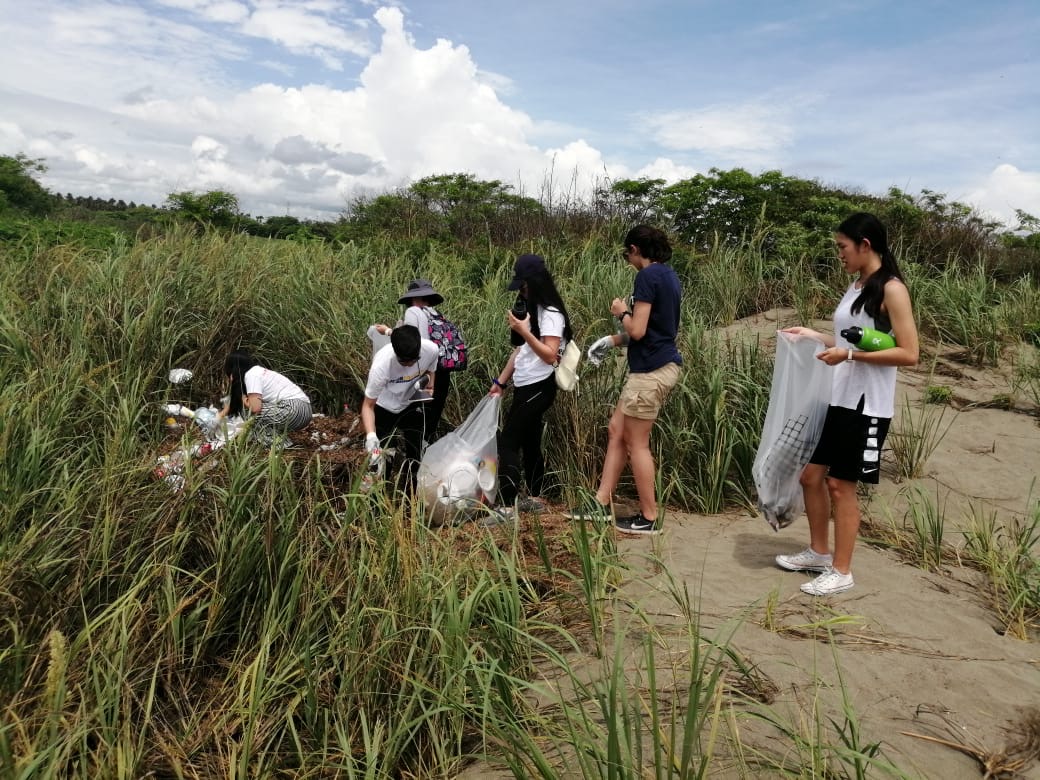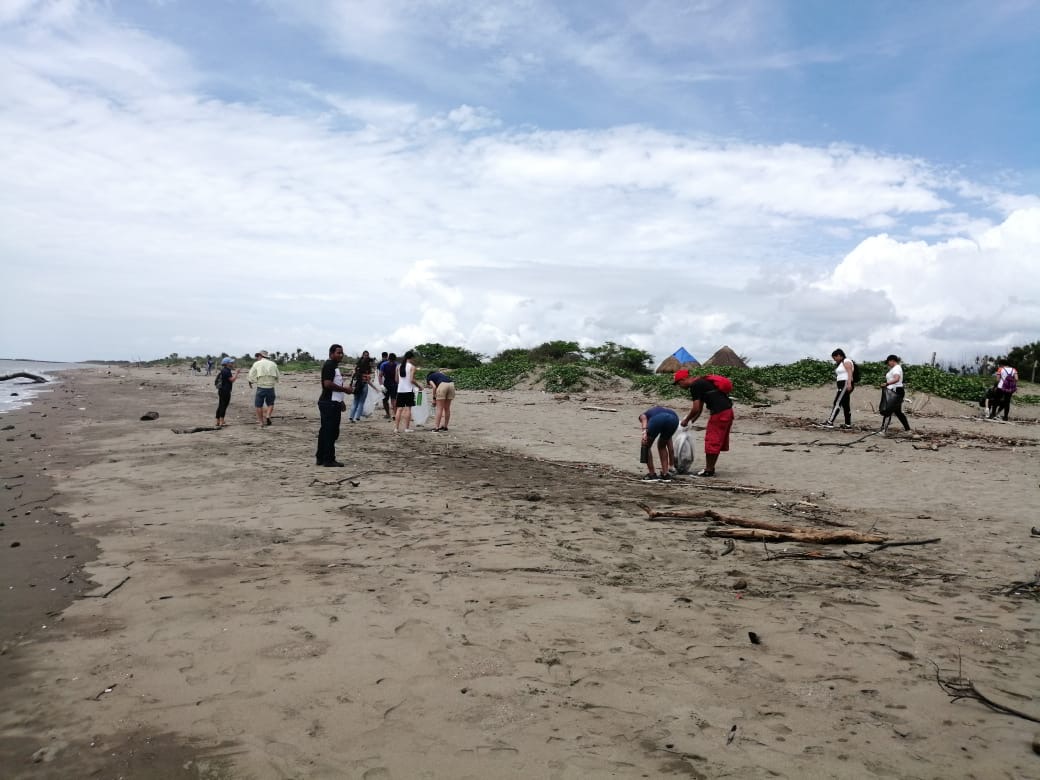
A picture of the TWO Chitre groups working on the site.

Glimpsers finding a trove of trash and facing it head on!

Glimpsers collecting trash along the shoreline
The environmental crisis is, in my opinion and scientifically, one of the most pertinent issues that lie on the human population at the moment. Whenever the environment comes to mind, the first problem that comes to mind is global warming: the concept where light energy from the sun is absorbed by the atmosphere due to gasses such as carbon dioxide, water vapor, or chlorofluorocarbons. From what we learned from today, this is only one of a huge variety of issues that plague the global society. Ocean acidification due to an influx of carbon in the atmosphere leads the coral bleaching; eutrophication from nitrogen-rich irrigative runoff from farming operations leads to oxygen-depleting algal blooms; municipal solid waste is being buried or leeched into the oceans thousands of times faster than we can manage it; the list is almost never ending. In a world like this, it can often seem overwhelming to think about all of the problems that plague us, and gain the mentality that “individuals have no bearing on improving or worsening the environment.” It is this warranted, yet flawed mentality that fuels many of the environmental issues we have today. At the beginning of the day, for the mental warm-up, I decided to share this phenomenon with my fellow glimpsers, in hopes of deterring them from assuming it as well. I told them that if everyone were to make minute, yet purposeful changes inside of their daily lifestyle, that the effect would be profound on a grander scale. Of course, we cannot expect everyone in the world to follow a sustainable mentality. When we were listening to the stance of many of the indigenous people on their opinions on environmental protection and its influence on their actions, I was in awe of the care that they stated for the environment. I was shocked that people would stop to think about the effect they had on the environment. That they would increase costs or working a few steps harder in order to minimize the detrimental environmental impact they had. After speaking with one of our Global Glimpse leaders, David White, at the end of the day about the topic, I realized how American and truly capitalistic this mindset was. Only in the “Estados Unidos” (United States) do we favor economic growth without ever taking note of the economic, social, or humane implications of our actions. The deviation from this ideology was at the core of the most inspiring people I met today: the delegates representing Mundo Verde (MUNVER). MUNVER was the environmental organization that we were cleaning up the beach under. Most of the delegates actually came from the United States, yet had a deep and almost infectious passion to protect the environment of Panama. One of the delegates had the responsibility of presenting to us the issues contributing to the environmental situation the global community faces, and the ones that specifically impact Panama. The other side of the delegates was the meeting we had with them before we started to do the beach cleanup. They spoke about the shorelines as if they were their homes, and described the mangroves as if they were their own children. This sharp urge for change fueled our group to go above and beyond with our garbage cleanup, to the point where it soon became difficult to clean up the beach because it was hard for us to find any more trash to clean up. At the beginning, I was admittedly confused as to the effect of cleaning up one beach would hold on the environment. This was mitigated once I learned a story from one of the MUNVER ambassadors. Once she was walking along the shoreline and noticed a ditch with a sizable pile of trash next to it. Instead of walking by and hoping someone else would deal with it, she took action with one of her friends and started to pick up the trash, but was only able to remove about half of it. Nevertheless, local people passing by applauded her efforts, and took note of the ditch. By the next day, when she came back to take away the rest of the trash, she was astonished to find out that another person had already come by to do so. Afterwards, she never saw trash being thrown inside the same trench again. This story had three main takeaways that I think are the most significant from today.
- Whenever you’re in a situation where you consider, “someone else will deal with it,” they probably won’t, or else the situation would already have been dealt with.
- Once an issue is initiated, people will believe that it is ethical for them to instantiate it.
- The influence of a single person or a small community should never be undermined, as you are the inauguration of social and physical change of the general public.
These takeaways definitely do not solely apply to environmental degradation, but a variety of other societal issues that we face. I know that my fellow Glimpsers and I will use the experience of the day to become better, more sustainable, and more environmentally aware global citizens.

Shrey, as always you are so passionate about the environment. It may seem exhausting to some but we are proud of it. We know how much you care about it. Having said that, I hope you enjoyed meeting other team and had fun along the way 😉 I love your passion towards issues that affect everyone. Can’t wait to see more! – love dad.
Thanks for the descriptive blog much appreciated. Another amazing work! We are very proud of you all.Keep learning things and hopefully this will lead to increased awareness in individuals/community that their behavior and the fitness of the environment are correlated. Keep your energy. Love seeing the pictures of your happy faces.
Josh said Hi Mariah..we all miss you …
Love -Mom & Dad
Wow Shrey, what a thoughtful blog. Your understanding on global warming and urge to help out and make a difference is evident in your expressive writing. The two groups worked really hard today, I’m highly impressed! I also noticed that you met Soniya’s group. Yay!! Another thing I noticed in the pictures is that you got sun burn, I hope not! Make sure to apply a lot of sunscreen before you head out. And stay hydrated!-
Great job today bud!- Lot’s of love- Mom
PS: Shreysi wanted to tell you that she perfectly parallel parked the car today outside our home, and she is so proud of it! Her driving is improving day by day 🙂
hey shrey! shreysi here 🙂 i thought i’d comment that i really liked your blog post, it was super well written and you sounded like the ultimate vegan! in terms of interesting news the warriors lost the playoffs ): and we all miss you dearly here. life’s not as fun without you so i’m counting the days till you get back! but while you are there make sure to have fun and don’t forget to live in the moment every second and go stargazing at some point because that was one of my favorite parts last year. i love you!!!
Shrey, Wonderfully written essay! I loved the depth and feeling relayed in the article. Especially loved the spirit behind the following sentence:
” I told them that if everyone were to make minute, yet purposeful changes inside of their daily lifestyle, that the effect would be profound on a grander scale.”
Hey bella i know you enjoyed cleaning the shoreline with your fellow glimpses making changes & taking advantage of your opportunity like i said you would ! i love you, have fun & be safe ❤️